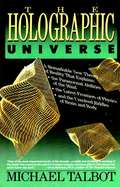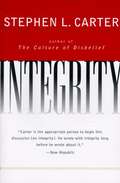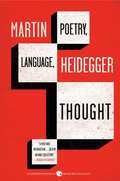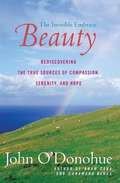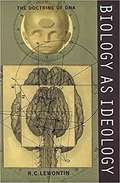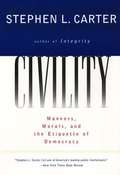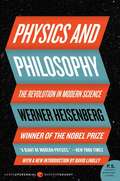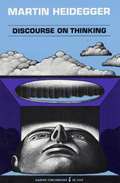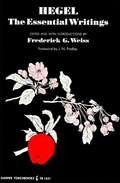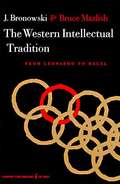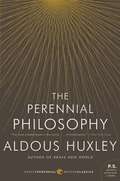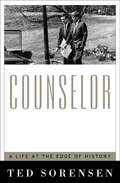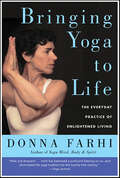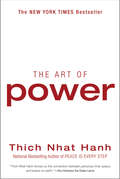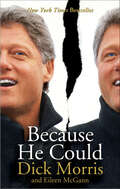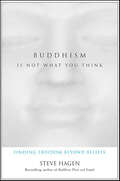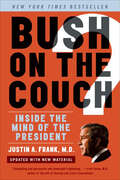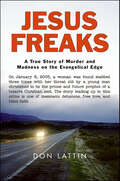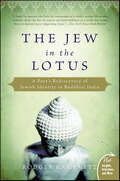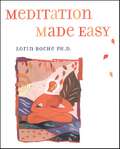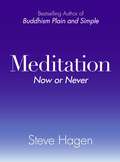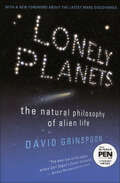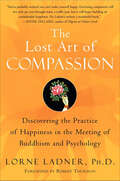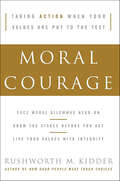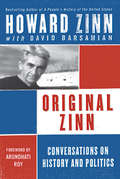- Table View
- List View
The Holographic Universe
by Michael TalbotThese relatively new data are of such far-reaching relevance that they could revolutionize our understanding of the human psyche, of psychopathology, and of the therapeutic process. Some of the observations transcend in their significance the framework of psychology and psychiatry and represent a serious challenge to the current Newtonian-Cartesian paradigm of Western science. They could change drastically our image of human nature, of culture and history, and of reality.
Integrity
by Stephen L. CarterIn this book, Stephen Carter examines why the virtue of integrity holds such sway over the American political imagination. By weaving together insights from philosophy, theology, history and law, along with examples drawn from current events and a dose of personal experience, Carter offers a vision of integrity that has implications for everything from marriage and politics to professional football. He discusses the difficulties involved in trying to legislate integrity as well as the possibilities for teaching it.
Poetry, Language, Thought (Harper Perennial Modern Thought Ser.)
by Martin HeideggerPoetry, Language, Thought collects Martin Heidegger's pivotal writings on art, its role in human life and culture, and its relationship to thinking and truth. Essential reading for students and anyone interested in the great philosophers, this book opens up appreciation of Heidegger beyond the study of philosophy to the reaches of poetry and our fundamental relationship to the world. Featuring "The Origin of the Work of Art," a milestone in Heidegger's canon, this enduring volume provides potent, accessible entry to one of the most brilliant thinkers of modern times.
Beauty: The Invisible Embrace
by John O'DonohueBeauty does not linger, it only visits. <p><p> Yet beauty's visitation affects us and invites us into its rhythm, <p> it calls us to feel, think, and act beautifully in the world: <p> to create and live a life that awakens the Beautiful. <p> Beauty is a gentle but urgent call to awaken. Bestselling author John O'Donohue opens our eyes, hearts, and minds to the wonder of our own relationship with beauty by exposing the infinity and mystery of its breadth. His words return us to the dignity of silence, profundity of stillness, power of thought and perception, and the eternal grace and generosity of beauty's presence. In this masterful and revelatory work, O'Donohue encourages our greater intimacy with beauty and celebrates it for what it really is: a homecoming of the human spirit. As he focuses on the classical, medieval, and Celtic traditions of art, music, literature, nature, and language, O'Donohue reveals how beauty's invisible embrace invites us toward new heights of passion and creativity even in these uncertain times of global conflict and crisis.
Biology As Ideology: The Doctrine Of DNA
by Richard C. LewontinFollowing in the fashion of Stephen Jay Gould and Peter Medawar, one of the world's leading scientists examines how "pure science" is in fact shaped and guided by social and political needs and assumptions.
Civility: Manners, Morals, And The Etiquette Of Democracy
by Stephen L. CarterIn this followup toIntegrity,Yale law professor Stephen Carter continues to meditate upon the "prepolitical" qualities on which a healthy society is based.Why do people show poorer manners today than in previous ages? How did we come to confuse rudeness with self-expression and acting on our "rights"? Carter looks at these and other important questions with a combination of his personal experiences and an extremely long shelf of reading material, all the while maintaining an informal writing style that continuallybut politelyengages the reader, inviting him or her to think about these issues along with Carter.There are important messages here about generosity and trust, about respecting diversity and dissent, and about resolving conflict through dialogue rather than mandate. Stephen Carter would never be so uncivil as to demand your attention, butCivilitymost definitely compels.
Physics and Philosophy
by Werner HeisenbergThe seminal work by one of the most important thinkers of the twentieth century, Physics and Philosophy is Werner Heisenberg's concise and accessible narrative of the revolution in modern physics, in which he played a towering role. The outgrowth of a celebrated lecture series, this book remains as relevant, provocative, and fascinating as when it was first published in 1958. A brilliant scientist whose ideas altered our perception of the universe, Heisenberg is considered the father of quantum physics; he is most famous for the Uncertainty Principle, which states that quantum particles do not occupy a fixed, measurable position. His contributions remain a cornerstone of contemporary physics theory and application.
Discourse on Thinking
by Martin HeideggerDiscourse on Thinking questions that must occur to us the moment we manage to see a familiar situation in unfamiliar light.
Essential Writings
by Georg Wilhelm Friedrich Hegel Frederick G. WeissHegel's essential writings on all aspects of philosophy
The Western Intellectual Tradition: From Leonardo to Hegel
by Jacob Bronowski Bruce MazlishThe history of science has been successfully integrated with other intellectual and political developments in the Western tradition, instead of being cut off as a recondite specialty untouched by the humanists. The method used by Brunswick and Mazlish is to select twenty-five or more key persons or events and to weave the whole chronicle of Western thought from Leonardo to Hegel (inclusive) around them. Their work is therefore less abstract than some histories of thought of a similar compass, since it does not hesitate to deal with specific persons and even political events: intellectual history is not reduced to themes and elements. The individual chapters, since they are really examples, present the newest learned evidence with some detail and even indicate the scholarly controversies that are involved. References to the learned literature in these essays are invariably apt.
The Perennial Philosophy: An Interpretation of the Great Mystics, East and West
by Aldous HuxleyAn inspired gathering of religious writings that reveals the "divine reality" common to all faiths, collected by Aldous Huxley "The Perennial Philosophy," Aldous Huxley writes, "may be found among the traditional lore of peoples in every region of the world, and in its fully developed forms it has a place in every one of the higher religions. " With great wit and stunning intellect-drawing on a diverse array of faiths, including Zen Buddhism, Hinduism, Taoism, Christian mysticism, and Islam-Huxley examines the spiritual beliefs of various religious traditions and explains how they are united by a common human yearning to experience the divine. The Perennial Philosophy includes selections from Meister Eckhart, Rumi, and Lao Tzu, as well as the Bhagavad Gita, Tibetan Book of the Dead, Diamond Sutra, and Upanishads, among many others.
Counselor: A Life at the Edge of History
by Theodore C. SorensonIn his memoir Counselor, Theodore C. Sorensen recounts advising John F. Kennedy through the most dramatic moments in American history.JFK’s closest guide, Sorensen begins his story in January 1953, when he and the freshman senator from Massachusetts began their extraordinary professional and personal relationship. Rising from legislative assistant to speechwriter and advisor, the young lawyer from Nebraska worked closely with JFK on his most important speeches, as well as his book Profiles in Courage. Sorensen encouraged the junior senator's political ambitions—from a failed bid for the vice presidential nomination in 1956 to the successful presidential campaign in 1960, after which he was named Special Counsel to the President.Sorensen describes in thrilling detail his experience advising JFK during some of the most crucial days of his presidency, from the decision to go to the moon to the Cuban Missile Crisis, when JFK requested that the thirty-four-year-old Sorensen draft the key letter to Khrushchev at the most critical point of the world's first nuclear confrontation. After Kennedy was assassinated, Sorensen stayed with President Johnson for a few months before leaving to write a biography of JFK. In 1968 he returned to Washington to help run Robert Kennedy's presidential campaign. Through it all, Sorensen never lost sight of the ideals that brought him to Washington and to the White House, working tirelessly to promote and defend free, peaceful societies.“This book is instantly essential for any student of the period. It fills gaps in the historical record; it vividly conveys life inside the administration; and it generously dishes anecdotes.” —Washington Post
Bringing Yoga to Life: The Everyday Practice of Enlightened Living
by Donna FarhiInternationally renowned and bestselling author Donna Farhi moves yoga practice beyond the mat into our everyday lives, restoring the tradition's intended function as a complete, practical philosophy for daily living. Expanding upon the teachings of Patanjali's Yoga Sutras, the core text of the yoga tradition, Donna Farhi describes yoga's transforming power as a complete life practice, far beyond its common reduction to mere exercise routine or stress management. This is the philosophy of yoga as a path to a deeper awareness of self. Drawing upon her years of teaching with students, Farhi guides readers through all the pitfalls and promises of navigating a spiritual practice. Farhi's engaging and accessible style and broad experience offer important teachings for newcomers and seasoned practitioners of yoga alike. And because her teachings of yoga philosophy extend into every corner of daily life, this book is an equally accessible guide to those seeking spiritual guidance without learning the pretzel bendings of the physical practice itself. As one of the top teachers worldwide, Farhi's exploration of the core philosophy of yoga is destined to become an instant classic.
The Art of Power
by Thich Nhat Hanh"Power is good for one thing only: to increase our happiness and the happiness of others. Being peaceful and happy is the most important thing in our lives and yet most of the time we suffer, we run after our cravings, we look to the past or the future for our happiness." Turning our conventional understanding of power on its head, world-renowned Zen master, spiritual leader, and national bestselling author Thich Nhat Hanh reveals how true power comes from within. What we seek, we already have. Whether we want it or not, power remains one of the central issues in all of our lives. Every day, each of us exercises power in many ways, and our every act subtly affects the world we live in. This struggle for control and authority permeates every aspect of our private and public lives, preventing us from attaining true happiness. The me-first mentality in our culture seeps unnoticed into our decisions and choices. Our bottom-line approach to getting ahead may be most visible in the business world, but the stress, fear, and anxiety it causes are being felt by people in all walks of life. With colorful anecdotes, precise language, and concrete practices, Thich Nhat Hanh illustrates how the current understanding of power leads us on a never-ending search for external markers like job title or salary. The Art of Power boldly challenges our assumptions and teaches each of us how to access the true power that is within our grasp.
Because He Could
by Dick Morris Eileen McGannWho is Bill Clinton?A man whose presidency was disgraced by impeachment -- yet who remains one of the most popular presidents of our time.A man whose autobiography, My Life, was panned by critics as a self-indulgent daily diary -- but rode the bestseller lists for months.A man whose policies changed America at the close of the twentieth century -- yet whose weakness left us vulnerable to terror at the dawn of the twenty-first.No one better understands the inner Bill Clinton, that creature of endless and vexing contradiction, than Dick Morris. From the Arkansas governor's races through the planning of the triumphant 1996 reelection, Morris was Clinton's most valued political adviser. Now, in the wake of Clinton's million-selling memoir My Life, Morris and his wife, Eileen McGann, set the record straight with Because He Could, a frank and perceptive deconstruction of the story Clinton tells -- and the many more revealing stories he leaves untold.With the same keen insight they brought to Hillary Clinton's life in their recent bestseller Rewriting History, Morris and McGann uncover the hidden sides of the complicated and sometimes dysfunctional former president. Whereas Hillary is anxious to mask who she really is, they show, Bill Clinton inadvertently reveals himself at every turn -- as both brilliant and undisciplined, charming yet often filled with rage, willing to take wild risks in his personal life but deeply reluctant to use the military to protect our national security. The Bill Clinton who emerges is familiar -- reflexively blaming every problem on right-wing persecutors or naïve advisers -- but also surprising: passive, reactive, working desperately to solve a laundry list of social problems yet never truly grasping the real thrust of his own presidency. And while he courted danger in his personal life, the authors argue that Clinton's downfall has far less to do with his private demons than with his fear of the one person who controlled his future: his own first lady.Sharp and stylishly written, full of revealing insider anecdotes, Because He Could is a fresh and probing portrait of one of the most fascinating, and polarizing, figures of our time.
Buddhism Is Not What You Think: Finding Freedom Beyond Beliefs
by Steve HagenA practical, straight-forward guide to the true purpose of Buddhism, examining the essential & enduring questions at the heart of the Buddha’s teachings.Bestselling author and renowned Zen teacher Steve Hagen penetrates the most essential and enduring questions at the heart of the Buddha’s teachings: How can we see the world in each moment, rather than merely as what we think, hope, or fear it is? How can we base our actions on reality, rather than on the longing and loathing of our hearts and minds? How can we live lives that are wise, compassionate, and in tune with reality? And how can we separate the wisdom of Buddhism from the cultural trappings and misconceptions that have come to be associated with it?Drawing on down-to-earth examples from everyday life and stories from Buddhist teachers past and present, Hagen tackles these fundamental inquiries with his trademark lucid, straightforward prose. The newcomer to Buddhism will be inspired by this accessible and provocative introduction, and those more familiar with Buddhism will welcome this much needed hands-on guide to understanding what it truly means to be awake. By being challenged to question what we take for granted. We come to see the world as it truly is. Buddhism Is Not What You Think offers a profound and clear path to joy and freedom.Praise for Buddhism Is Not What You Think “Hagen’s writing flows in a tranquil way, like a spring trickling up effortlessly from the earth. One tends to stop judging it and just appreciate it for its own sake. Since this appreciation is his advice for dealing with everything, the sentences themselves actually create what they are describing.” —Robert M. Pirsig, author of Zen and the Art of Motorcycle Maintenance“This is not just another nice book about Buddhism, one telling us what we like to hear and are used to hearing. No—it is a clear and challenging showing of the fundamental truth of our lives. This is an exceptional book. Make good use of it.” —Charlotte Joko Beck, author of Everyday Zen
Bush on the Couch: Inside the Mind of the President
by Justin A. FrankWith the Bush administration in permanent crisis, a renowned Washington psychoanalyst updates his portrait of George W.'s public persona—and how it has damaged the presidency.Insightful and accessible, courageous and controversial, Bush on the Couch sheds startling new light on George W. Bush's psyche and its impact on the way he governs, tackling head-on the question few seem willing to ask: Is our president psychologically fit to run the country? With an eye for the subtleties of human behavior sharpened by thirty years of clinical practice, Dr. Justin A. Frank traces the development of Bush's character from childhood through his presidency, identifying and analyzing his patterns of thought, action, and communication. The result is a troubling portrait filled with important revelations about our nation's leader—including disturbing new insights into:How Bush reacted to the 2006 Democratic sweep in Congress with a new surge of troops into IraqHis telling habits and coping strategies—from his persistent mangling of English to his tendency to "go blank" in the midst of crisisThe tearful public breakdown of his father, George H. W. Bush, and what it says about the former president's relationship to his prominent sonsThe debacle of Katrina—the moment when Bush's arrogance finally failed himWith a new introduction and afterword, Bush on the Couch offers the most thorough and candid portrait to date of arguably the most psychologically damaged president since Nixon.
Jesus Freaks: A True Story of Murder and Madness on the Evangelical Edge
by Don LattinIn the tradition of Jon Krakauer's Under the Banner of Heaven, Don Lattin's Jesus Freaks is the story of a shocking pilgrimage of revenge that left two people dead and shed new light on The Family International, one of the most controversial religious movements to emerge from the spiritual turmoil of the sixties and seventies.Some say The Family International—previously known as the Children of God—began with the best intentions. But their sexual and spiritual excesses soon forced them to go underground and follow a dark and dangerous path. Their charismatic leader, David "Moses" Berg, preached a radical critique of the piety and hypocrisy of mainstream Christianity. But Berg's message quickly devolved into its own web of lies. He lusted for power and unlimited access to female members of his flock—including young girls and teenagers—and became a drunken tyrant, setting up re-indoctrination camps around the world for rebellious teenagers under his control. Thousands of children raised in The Family would defect and try to live normal lives, but the prophet's heir apparent, Ricky "Davidito" Rodriguez, was unable to either bear the excesses of the cult or fit into normal society. Sexually and emotionally abused as a child, Ricky left the fold and began a crusade to destroy the only family he ever knew, including a plot to kill his own mother.Veteran journalist Don Lattin has written a powerful, engrossing book about this uniquely American tragedy. Jesus Freaks is a cautionary tale for those who fail to question the prophesies and proclamations of anyone who claims to speak for God.
The Jew in the Lotus: A Poet's Rediscovery of Jewish Identity in Buddhist India
by Rodger KamenetzWhile accompanying eight high–spirited Jewish delegates to Dharamsala, India, for a historic Buddhist–Jewish dialogue with the Dalai Lama, poet Rodger Kamenetz comes to understand the convergence of Buddhist and Jewish thought. Along the way he encounters Ram Dass and Richard Gere, and dialogues with leading rabbis and Jewish thinkers, including Zalman Schacter, Yitz and Blue Greenberg, and a host of religious and disaffected Jews and Jewish Buddhists. This amazing journey through Tibetan Buddhism and Judaism leads Kamenetz to a renewed appreciation of his living Jewish roots.
Meditation Made Easy
by Lorin RocheYou′ve probably heard about the benefits of meditation: Sharper thinking, reduced stress, improved concentration, lower blood pressure, even increased sexual pleasure , all of these positive effects have been confirmed by science. In this uniquely accessible guide, Lorin Roche shows that meditation is that easy , and pleasurable. Roche answers questions and debunks meditation myths, and gives three easy-to-follow techniques for getting started 塴he Do Nothing Technique," "Salute Each of the Senses," and "Feeling at Home Exercise". He and shows you how to integrate "mini meditations" into spare moments of the day, from savouring morning coffee to taking advantage of the five minutes before a meeting. He explains how to overcome meditation obstacles, customise meditation to your own needs, and use your breath, voice, and attention as meditation aids. And he shows how meditation will give you the power to explore your inner passions , and enrich your sense of self.
Meditation: Now or Never
by Steve HagenA simple, jargon-free introduction to meditation that’s “clear as a mountain stream” (Stephen Levine, author of A Year to Live).National bestselling author and teacher Steve Hagen strips away the cultural and religious jargon surrounding meditation and provides an accessible and thorough manual for newcomers and experienced practitioners alike. Inside you will find:Simple practices to avoid needlessly complicating meditationWhere most of us get stuck in meditation—and how to get unstuckA unique focus on meditation not simply as a spiritual technique, but as a way of living“For the beginner, a lucid, no-frills introduction to Buddhist meditation. For the practitioner, a timely reminder of what meditation is all about.” —Stephen Batchelor, author of Buddhism Without Beliefs“Brief and wonderfully accessible.” —Publishers Weekly
Lonely Planets: The Natural Philosophy of Alien Life
by David GrinspoonPEN Literary Award Winner: &“The best, most entertaining examination of the possibility of other life in the universe since [Carl] Sagan&’s best work.&” —Boulder Daily Camera It&’s been decades since Carl Sagan first addressed the general public about the possibility of extraterrestrial life from a scientist&’s perspective. We&’ve learned a lot in those years, and now planetary scientist David Grinspoon investigates the big questions: How widespread are life and intelligence in the cosmos? Is life on Earth an accident, or in some sense the &“purpose&” of this universe? And how can we, working from the Earth-centric definition of &“life,&” even begin to think about the varieties of life-forms on other planets? In accessible, lively prose, and using the topic of extraterrestrial life as a mirror with which to view human beliefs, evolution, history, and aspirations, Grinspoon takes us on a three-part journey—the history of our expanding awareness of other planets and our ideas on alien life dating back to the earliest days of astronomy; the science of cosmic evolution and the evolution of life on Earth, including a critique of the &“Rare Earth hypothesis&”; and the beliefs that humans hold, addressing the limits of our ability to conceptualize or communicate with intelligent aliens and the scientific and philosophical implications of far-future evolutionary possibilities. Rich in personal and often amusing anecdotes, Lonely Planets explores the shifting boundary between planetary science and natural philosophy, and reveals how the search for extraterrestrial life unites our spiritual and scientific quests for connection with the cosmos. Includes a new foreword about recent Mars discoveries &“An outstanding introduction to cosmic evolution.&” —San Jose Mercury News &“[A] terrific book.&” —San Diego Union-Tribune &“A personable chat on life, the universe and everything.&” —Publishers Weekly
The Lost Art of Compassion: Discovering the Practice of Happiness in the Meeting of Buddhism and Psychology
by Lorne LadnerA practical guide to cultivating compassion in those difficult moments of daily life: “Inspiring for all of us, therapists and patients alike.” —Mark Epstein, MD, author of Thoughts Without a ThinkerCompassion is often seen as a distant, altruistic ideal cultivated by saints, or as an unrealistic response of the naively kind-hearted. Seeing compassion in this way, we lose out on experiencing the transformative potential of one of our most neglected inner resources.Dr. Lorne Ladner rescues compassion from this marginalized, idealized place, showing how its practical application in our life can be a powerful force in achieving happiness. Combining the wisdom of Tibetan Buddhism and Western psychology, Ladner presents clear, effective practices for cultivating compassion in daily living.“[A] realistic, manageable approach to dispelling bitterness and anger and replacing it with empathy and patience.” —Publishers Weekly“You’ve probably noticed you can’t make yourself happy. Exercising compassion will not only get you through many a traffic jam . . . it will begin building an unshakeable happiness . . . a wonderful book.” —Annie Dillard, author of Pilgrim at Tinker CreekIncludes a foreword by Robert Thurman
Moral Courage
by Rushworth M. KidderWhy did a group of teenagers watch a friend die instead of putting their own reputations at risk? Why did a top White House official decide to come clean and accept a prison sentence during Watergate? Why did a finance executive turn down millions out of respect for her employer? Why are some willing to risk their futures to uphold principles? What gives us the strength to stand up for what we believe?As these questions suggest, the topic of moral courage is front and center in today's culture. Enron, Arthur Andersen, the U.S. Olympic Committee, abusive priests, cheating students, domestic violence -- all these remind us that taking ethical stands should be a higher priority in our culture. Why, when people discern wrongdoing, are they sometimes unready, unable, or unwilling to act?In a book rich with examples, Rushworth Kidder reveals that moral courage is the bridge between talking ethics and doing ethics. Defining it as a readiness to endure danger for the sake of principle, he explains that the courage to act is found at the intersection of three elements: action based on core values, awareness of the risks, and a willingness to endure necessary hardship. By exploring how moral courage spurs us to strive for core values, he demonstrates the benefits of ethical action to the individual and to society -- and the severe consequences that can result from remaining morally dormant.Moral Courage puts indispensable concepts and tools into our hands, equipping us to respond to the increasingly complicated moral challenges we face at work, at home, and in our communities. It enables us to make clear, confident decisions by exploring some litmus-test questions:Is the benefit worth the risk?Am I motivated by my desire to uphold my beliefs or just to impose them on others?Will my actions create collateral damage among those with no stake in the outcome?While physical courage may no longer be a necessary survival skill or an essential rite of passage out of childhood, few would dispute the growing need for moral courage as the true gauge of maturity. Treating this subject not as an esoteric branch of philosophy but as a practical necessity for modern life, Kidder deftly leads us to a clear understanding of what moral courage is, what it does, and how to get it.
Original Zinn: Conversations on History and Politics
by Howard ZinnHistorian, activist, and bestselling author Howard Zinn has been interviewed by David Barsamian for public radio numerous times over the past decade. Original Zinn is a collection of their conversations, showcasing the acclaimed author of A People's History of the United States at his most engaging and provocative.Touching on such diverse topics as the American war machine, civil disobedience, the importance of memory and remembering history, and the role of artists--from Langston Hughes to Dalton Trumbo to Bob Dylan--in relation to social change, Original Zinn is Zinn at his irrepressible best, the acute perception of a scholar whose impressive knowledge and probing intellect make history immediate and relevant for us all.
